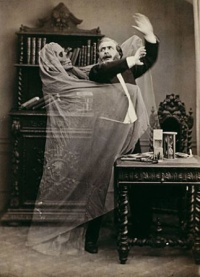Spirit
From The Art and Popular Culture Encyclopedia
| Revision as of 20:10, 17 April 2021 Jahsonic (Talk | contribs) ← Previous diff |
Revision as of 20:12, 17 April 2021 Jahsonic (Talk | contribs) Next diff → |
||
| Line 7: | Line 7: | ||
| {{Template}} | {{Template}} | ||
| - | In [[folk belief]], '''spirit''' is the vital principle or animating force within all living things. As far back as 1628 and 1633 respectively, both [[William Harvey]] and [[René Descartes]] speculated that somewhere within the body, in a special locality, there was a ‘vital spirit’ or 'vital force', which animated the whole bodily frame, just as the engine in a factory moves the machinery in it. Spirit has frequently been conceived of as a [[supernatural]] being, or [[non-physical entity]]; for example, a [[demon]], [[ghost]], [[fairy]], or [[angel]]. | + | In [[folk belief]], '''spirit''' is the [[vital]] principle or animating force within all living things. As far back as 1628 and 1633 respectively, both [[William Harvey]] and [[René Descartes]] speculated that somewhere within the body, in a special locality, there was a ‘vital spirit’ or 'vital force', which animated the whole bodily frame, just as the engine in a factory moves the machinery in it. Spirit has frequently been conceived of as a [[supernatural]] being, or [[non-physical entity]]; for example, a [[demon]], [[ghost]], [[fairy]], or [[angel]]. |
| Historically, spirit has been used to refer to a "subtle" as opposed to "gross" material substance, as put forth in the notable last paragraph of [[Sir Isaac Newton]]'s ''[[Philosophiæ Naturalis Principia Mathematica|Principia Mathematica]]''. In [[Bible translations into English|English Bibles]], "the Spirit" (with a capital "S"), specifically denotes the [[Holy Spirit]]. | Historically, spirit has been used to refer to a "subtle" as opposed to "gross" material substance, as put forth in the notable last paragraph of [[Sir Isaac Newton]]'s ''[[Philosophiæ Naturalis Principia Mathematica|Principia Mathematica]]''. In [[Bible translations into English|English Bibles]], "the Spirit" (with a capital "S"), specifically denotes the [[Holy Spirit]]. | ||
Revision as of 20:12, 17 April 2021

Illustration to the Speculum Sophicum Rhodostauroticum (1618) by Teophilus Schweighardt Constantiens

Illustration: Henri Robin and a Specter, 1863 by Eugène Thiébault
|
Related e |
|
Featured: |
In folk belief, spirit is the vital principle or animating force within all living things. As far back as 1628 and 1633 respectively, both William Harvey and René Descartes speculated that somewhere within the body, in a special locality, there was a ‘vital spirit’ or 'vital force', which animated the whole bodily frame, just as the engine in a factory moves the machinery in it. Spirit has frequently been conceived of as a supernatural being, or non-physical entity; for example, a demon, ghost, fairy, or angel.
Historically, spirit has been used to refer to a "subtle" as opposed to "gross" material substance, as put forth in the notable last paragraph of Sir Isaac Newton's Principia Mathematica. In English Bibles, "the Spirit" (with a capital "S"), specifically denotes the Holy Spirit.
The concepts of spirit and soul often overlap, and both are believed to survive bodily death in some religions, and "spirit" can also have the sense of ghost, i.e. a manifestation of the spirit of a deceased person. Spirit is also often used to refer to the consciousness or personality.
Namesakes
See also

